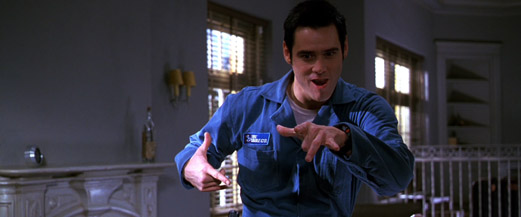Viking Night: The Cable Guy
By Bruce Hall
October 22, 2014
BoxOfficeProphets.com

But at the time, nobody had ever been paid that much for a movie. Not De Niro, not Pacino - not even Sean Connery, who in today’s cabbage made about $12 million to come out of retirement and play Old Fat Bond back in 1983. Because of this, a lot of people were eager to see The Cable Guy either score big or fall flat on its face. What they couldn’t have known is that future media darlings Ben Stiller and Judd Apatow already carried a lot of clout at the time. So when they landed the billion dollar man - Ace Ventura himself - for this dark, offbeat social satire, they pretty much had carte blanche to do whatever they wanted.
And what they came up with was actually better than you remember. But when your leading man gets paid enough to buy a slightly used Soviet warplane and the film barely earns it back opening weekend - get ready to hear people say you failed. Funny thing is, The Cable Guy actually really IS kind of a funny thing.
Matthew Broderick plays what he was born to play - a mild mannered, slightly dorky executive named Steve. His high pressure job has cut into his relationship, so he and fiancee Robin (Leslie Mann) are taking a break from each other. As such, Steve has moved into his own place, where he discovers the same thing we all did sometime in the mid ‘90s. If you want to watch television you can put away the rabbit ears and get your wallet out, because these days you have to pay to play. Because drinking alone is gauche and the internet was barely a thing in 1996, Steve decides to call the cable company.
They send over a strange, wiry man who calls himself Chip Douglas. Chip has an annoying lisp and a tendency to make aggressive, off-color jokes at inappropriate times. But he gets the job done, even hooking Steve up with free premium channels. In the course of making small talk, Chip suggests maybe they can hang out sometime. Steve agrees, but in the way you do when you’re just trying to be polite but clearly have no intention whatsoever of following through. But Chip is insistent in the way that sad, lonely people often are. So not wanting to be rude, Steve reluctantly accepts, and is surprised to enjoy himself.
That might have been the end of it except that Steve, being kind of a whiny creampuff, spills a little about his problems with Robin. Chip gives him some fairly solid advice - which works - and the next thing you know, Steve is a preferred cable customer AND back in the saddle with Robin again. Between the free HBO and complimentary sex-ed, you’d think this would skyrocket Chip straight to BFF status. But when Steve’s private life and Chip’s constant need for attention and validation come into conflict, strange things start to happen. When Steve fails to return Chip’s calls, his cable mysteriously goes out. A game of pickup basketball between Steve and his friends comes to an abrupt end when Chip shows up and pulls a Darryl Dawkins. Little by little, the cable guy starts appearing everywhere, becoming an uninvited fixture in Steve’s life. He makes friends with Steve’s friends, invites himself to family functions - all to Steve’s increasing bewilderment.
The Cable Guy is basically a stalker comedy, which is what makes it so simultaneously hilarious AND frustrating. At times, the story plays like a lighthearted fish-out-of-water comedy. Carrey is at his over-the-top best (or worst, depending on your level of appreciation) as someone who’s never really learned how to be a human being. And Broderick was put on this earth for many things, but one of them was to play exasperated yuppies. The movie makes much of the fact that Chip had inattentive parents who allowed him to be raised by the television. I guess that’s supposed to be a jab at the majority of the film’s demographic. But the movie never commits to the idea beyond a handful of obvious gags.
But let’s get back to that stalker-comedy thing. This movie’s namesake is a seriously maladaptive cable guy who becomes obsessed with a customer because they were (reluctantly) kind to him. If you make Broderick’s character Sarah instead of Steve, this is a whole different movie - and it’s the “creep” factor of being stalked by a dangerously deranged individual that gives the movie an edge - sometimes.
The scenes involving Steve’s family are played for laughs and for ick, and it really works. And then there’s the famous Medieval Times scene that you really have to be a Star Trek fan to truly appreciate. For that, and other reasons, it’s one of the most hilarious and moderately horrifying things you’ll ever see in a movie starring Jim Carrey and Matthew Broderick.
But again, the film never commits. And it’s that damned inconsistent tone that makes people rip on this movie so much. It’s funny, it’s dark, and it really does work well in a lot of places. The Cable Guy starts out a conventional comedy, but never really settles on what kind of story it wants to be. It flails at this all the way to the end, but in between is a somewhat satisfying, mostly entertaining, well cast comedy. It never quite catches stride, but never entirely falls flat on its face, either. Maybe that’s tepid praise, but compared to the hate this movie usually gets, it’s almost like getting $20 million for three months’ work.